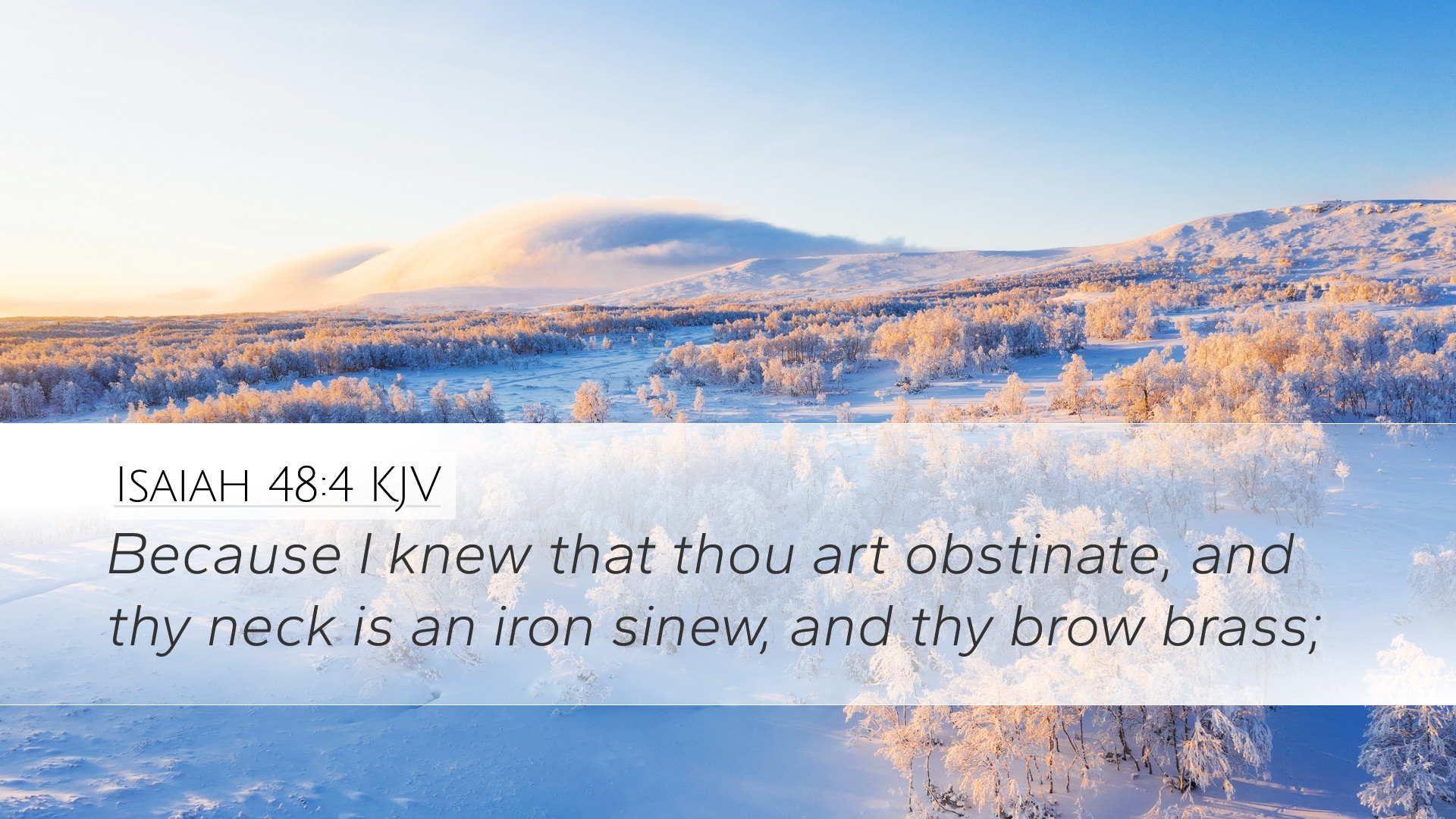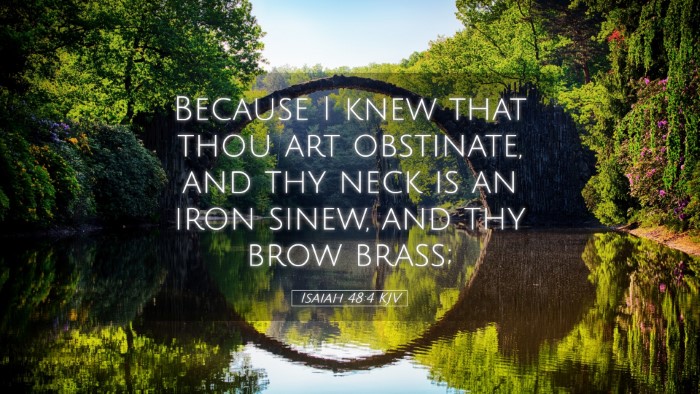Commentary on Isaiah 48:4
Isaiah 48:4 states: "Because I knew that you are obstinate, and your neck is an iron sinew, and your brow brass." This verse provides a penetrating insight into the character of Israel, reflecting their spiritual condition and relationship with God. The following commentary synthesizes insights from various public domain sources, focusing on the key themes and theological implications of this significant verse.
Contextual Background
To fully grasp the meaning of Isaiah 48:4, one must consider the broader context of the chapter and the book of Isaiah. The prophet Isaiah addresses the exiled Israelites, offering both condemnation and hope. The chapter begins with God distinguishing Himself from idols, reminding Israel of His sovereignty and faithfulness despite their failures.
Obstinacy and Stubbornness: A Divine Diagnosis
Isaiah vividly describes the obstinate nature of the people of Israel. Matthew Henry emphasizes this idea by noting that their “obstinacy” reveals a deep-seated rebellion against divine authority. God’s acknowledgment of their stubbornness serves not only to highlight their failure but also to demonstrate His patience and long-suffering.
Albert Barnes complements this thought by suggesting that Israel's “iron sinew” and “brass brow” symbolize a hardened heart. He draws parallels between physical strength and spiritual obstinacy, indicating that their resistance to God was not merely passive but active rebellion against divine revelation.
The Nature of Resistance
The terms used in this verse are rich in metaphorical significance. The imagery of iron and brass illustrates an unyielding spirit. Adam Clarke elaborates on this by noting that the stubbornness of Israel rendered them incapable of recognizing their own need for repentance and divine forgiveness. God’s prophetic warnings were met with resistance, demonstrating the tragic irony of their condition.
- Iron Sinew: Symbolizes physical strength and resilience but, in this context, represents spiritual defiance.
- Brass Brow: Indicates a forehead hardened against the truth, unfaltering in disbelief.
Divine Knowledge of Human Condition
This verse underscores God’s omniscience; He understands the inner workings of the human heart. As Henry points out, “God knows what is in man” (John 2:25). This knowledge not only informs His judgments but also shapes His calls to repentance. The acknowledgment that God knew their obstinacy beforehand serves both as a warning and an invitation to reconciliation.
Theological Implications
The verse raises profound theological questions about human free will and God’s sovereignty. How does divine foreknowledge harmonize with human choice? Clarke suggests that while God knows the path of each individual, His foreknowledge does not negate the reality of free will, as people are accountable for their choices. This notion invites theologians and scholars to explore the complexities of divine providence in light of human obstinacy.
Hope Amidst Judgment
Despite the stark critique of Israel's character, it is crucial to recognize that Isaiah’s message also carries a thread of hope. God’s desire for Israel is ultimately one of restoration. The acknowledgment of their rebellion sets the stage for a call to repentance and renewed covenant relationship. Barnes notes that the rebuke of the people is often compounded with promises of deliverance, highlighting God’s unending grace and the possibility of redemption.
Lessons for Contemporary Believers
For modern Christians, Isaiah 48:4 serves as a poignant reminder of the dangers of spiritual stubbornness. The call to humility and openness to God's correction is vital for spiritual growth. Believers are encouraged to examine their hearts for areas of defiance against divine instruction. The reminder of God’s patience with His people can inspire a renewed commitment to obedience and faithfulness.
Conclusion
Isaiah 48:4 encapsulates a rich array of insights about human nature, divine knowledge, and the character of God. Through the imagery of iron and brass, it illustrates the obstinacy of Israel and serves as both a warning and an invitation to repentance. Pastors, students, and theologians alike are called to reflect deeply on this verse, allowing it to challenge their spiritual walks and understanding of divine grace.


